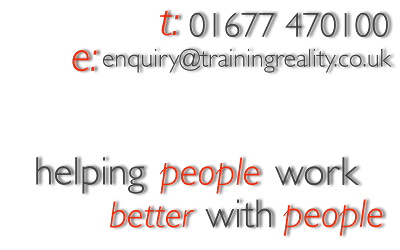Please press (at least!) one of these.
It costs you nothing, and (possibly) helps us spread the word!
Playing your cards close to your chest?
Thursday, 15 October 2009
On our management training courses here at trainingreality, one of the basic principles we operate under is openness. That’s a fairly standard approach to training courses - if people were reticent about sharing thoughts and insights, or said what they thought people wanted to hear rather than what they really thought, an enormous chunk of the value of training would be missing.
But it is also a principle we operate under more generally than that. As a business, we are open about the skills we can train on and the ones we can’t, about the bits we are good at and the bits we’re not, and we sincerely hope (and it seems to be the case) that our clients appreciate this level of openness and honesty.
There are, however, some potential pitfalls caused by this level of openness that need to be avoided, because, for it to work well and easily (without any problems), everyone needs to have that same spirit. The reality is that this is not the case, for a few different reasons:
1) Some people and organisations (unfortunately in my view) take a much less open approach than others. There can be rational reasons for this (some different ones discussed below) as well as irrational ones, just as there can be honest reasons as well as fundamentally dishonest ones. We’ll ignore the dishonest ones, as dealing with dishonesty is a lead into a whole new set of articles (which may happen later!).
2) People, and the organisations they work for, have differing models of the world, and what might seem open and honest to one party in a situation might be different for another party.
3) Finally, the way in which different people and organisations are open will vary as well, and it can be possible to miss the clues and signals that show where the honesty is.
--
Working on the assumption that we want to be honest and open in our dealings with customers, suppliers, teams, and colleagues (so we fit primarily into the latter two categories above), we can look at the action we can take to get the best results from our openness and honesty.
Firstly, working in reverse order, there is the risk of confused signals, either in terms of the signals we give or the ones we receive. There is something we can do about both of those:
(a) We can ensure that our outgoing communication is as clear, as tailored to the recipient, and as broad in its approach as possible. Communicating well means ensuring that the message that we want to deliver is delivered, accurately, at the right time, and to the right people, using the right language and medium, and doing it from the heart.
(b) When receiving information, we also need to take responsibility for the communication - the quality of our listening skills (to the words, tonality, body language, eyes and so on) will in part determine the quality of the message we receive.
In this type of open and honest communication, we should feel comfortable in asking questions, checking understanding, getting clarification...because the end goal of both parties is the same.
Secondly, there are different models of the world, which affect what each one of us believes to be open and honest, and which might also alter or restrict what we say depending on our perception of the best interests of the other person. Dealing with these in turn:
(a) If we are making choices about what we communicate (either adding more in or, more usually, leaving things out), we should question the rationale behind those choices and decisions. Are we really making those decisions in the interests of open and honest communication, or are there other reasons? Or are there any underlying reasons (obvious to us or much more subconscious) why we may choose to leave things out? The questioning process will help to clarify what our real intentions are.
(b) We often choose what to say based on our perception of the best interests of the other person. This may be correct, and may fall into the category of normal, cultural conventions (white lies), but it would be dangerous to the principle of open communication if we didn’t challenge those assumptions and really ask whether they are valid for the other person or not.
By challenging ourselves about the communication choices we make, we are taking the first step towards true honest communication - we care being honest with ourselves.
Finally, the big one - dealing with those people who choose to communicate in a way that is not open and honest. As mentioned right at the top, I’m going to ignore the deliberate dishonesty area (for now), as it’s a huge topic. Here, I want to delve into the honest reasons why people might not be as straightforward in their communication as they could be.
In my mind, there are two distinct categories here:
I want to, but...
This is not an “out loud” statement, but the thought that can cross our minds - we would love to have open and honest communication, but people will take advantage of us in some way. In short term business relationships, this might be the right approach to take, but I firmly believe that in longer term relationships (and especially with the teams you work with, your long-term customers and suppliers), you’ll never get to the satisfying and deep level of relationship if you constantly hold things back. Take a risk, be bold...you might be pleasantly surprised at the response you get, and, if not, you’ve learnt an awful lot about the other person’s approach.
If you are dealing with someone who you think might be having this thought (rather than it being yours), the best and simplest way of dealing with it is to start the process. be increasingly honest and open with them, and create the environment in which they will feel more comfortable removing the “but” from the headline sentence of this section.
I’m negotiating, so...
Negotiation is a classic area in which playing your cards close to your chest is seen as a real positive, and strategies for doing so are actually trained by some organisations. Again, I see a real difference here between short and long term strategies. In the short term (I’m thinking about the doorstep salesman who says that the low price will only be held if you sign now), it might work with some people (if you can sleep at night afterwards), but you will never create long-term relationships that way.
If you are being dealt with in this way, your communication skills are critical, as is your self confidence. The self-confidence part is the ability to and the knowledge that you can say no. The communication aspect is a little more subtle, but potentially easier for some people. It’s about noticing what is missing from the other party’s communication, and thinking about (maybe asking) why it is missing. there may be a good reason, but there may not, and by analytically observing the gaps in others’ communication, you’ll gain a much deeper understanding of what their intentions actually are.
Please press (at least!) one of these.
It costs you nothing, and (possibly) helps us spread the word!





